January 23/2009
Japan Fair Trade Commission
I. Purpose and Method of the Survey
- The animation industry structure has multiple tiers where planning and production of animation work is entrusted from one production to another among many smallscale entrepreneurs. A trading problem seems difficult to be revealed even if any such problem occurs. From the viewpoints of the Antimonopoly Act (Abuse of dominant bargaining position) and the Subcontract Act, the JFTC researched the situations of trades and trade practices.
- JFTC sent questionnaires to 533 productions (Number of valid responses: 114).
- JFTC gathered information from 44 companies and 4 associations including production companies, TV stations, ad agencies, DVD vendors and related associations.
II. The Summary of the Survey
1. Overview of the animation industry
- Over 60% of productions answering the questionnaire were small-scale entrepreneurs with capital of 10 million yen or less.
- Principal contractor production re-entrusts production work to subcontractors. Two thirds of the productions answering the questionnaire were re-entrusted with production of animation work from other productions.
2. Trading Problems and Issues
- Over 40% of productions answered that they had experienced being forced by ordering company to accept low production costs without sufficient consultation.
- There is a large difference of recognition between ordering company and entrusted contractor production in whether they had sufficient consultations on trade conditions.
=> The ordering company should make further efforts for sufficient consultation on trade conditions before ordering to improve them.
2
- Less than 20% of productions answered that they had always received orders in writing when re-entrusted from other productions.
- Over 80% of productions answered that deliver of written orders would be necessary or preferable.
- Compared with productions that had always received delivery of written orders,more of those without such documents answered that they had experienced disadvantages such as order cancellation, change of order, reworking and payment reduction.
=> The majority of productions desire written orders. In addition, it is important to ensure delivery of written orders to prevent actions that unfairly disadvantage entrusted productions.
- Unless the production invests in the production committee, the copyright does not in most cases belong to the production. Even in the conventional system where the TV station places the order to the production, 50% of the copyright of their works is solely held by the TV station.
- Principal contractor productions prominently expressed dissatisfaction about the copyright situation as described above and distribution of profits obtained from secondary use.
=>At present, it is not always clear in specific cases who owns the copyright under the Copyright Act. It is indispensable for the ordering company to sufficiently discuss with the entrusted productions (1) who own copyright and (2) consideration for any transfer of copyright.
Note that the system of intellectual properties including the copyright is expected to promote creation of intellectual properties and competition of use.
Concerning the establishment of copyright and who own the copyright, it is
important to see whether the animation creators’ creativity for animation work is stimulated, whether the incentive to new high-quality animation works is provided and whether the work will be positively used secondary.
3. The Japan Fair Trade Commission will,based on the results of this survey,request the industries concerned to check for any problem under the Antimonopoly Act or the Subcontract Act and to always have sufficient discussion on trade conditions and delivery of written documents when placing an order. The JFTC will continuously pay attention to the actual trade situation and, if the JFTC finds any specific fact suspected to be in violation of the Antimonopoly Act or the of laws or regulations.
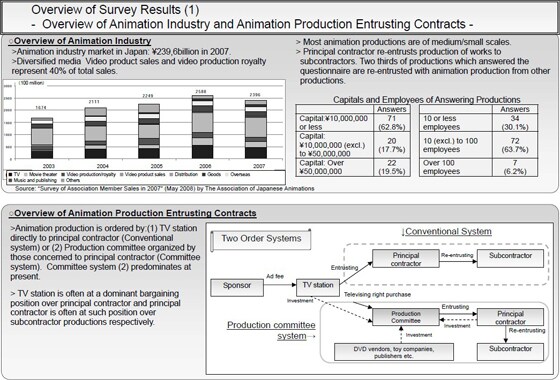
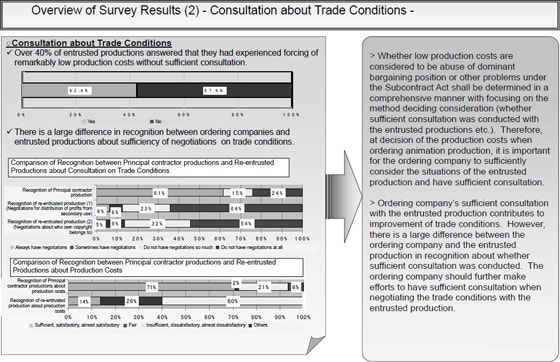
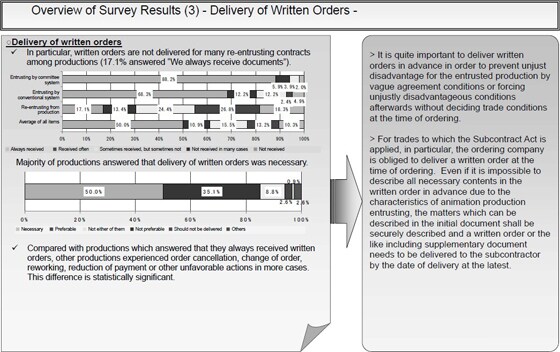
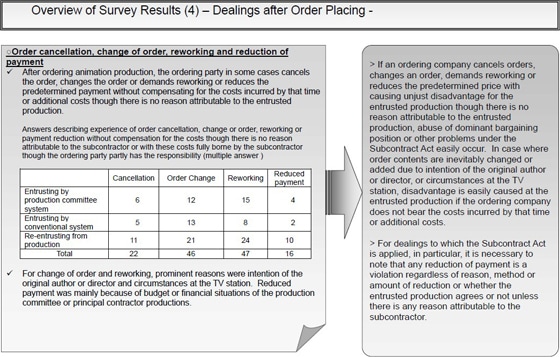
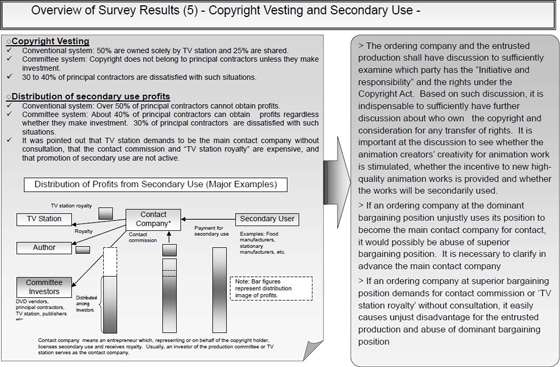
*Every announcement is tentative translation. Please refer to the original text written in Japanese.






